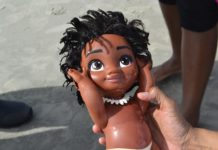I was born in a small Slavonian town, the first grandchild to my grandparents and niece to six aunts. We all lived together, in a red roofed traditional Slavonian house, with the requisite walnut tree in the front yard and a continually busy kitchen, where a large pot of beans and potatoes simmered slowly and cheese strudel cooled on the windowsill. Completing the idyllic Balkan image were a cat named Marko and a quarrelsome yet fiercely devoted pup, Geikie.
I called my grandmother majka (mother). She wore a variety of patterned headscarves at all times, tied over her carefully coiffed and hair sprayed ringlets, an apron over her ample bosom and wooden clogs on her feet. She swayed me gently on her knees, creating a cradle between the folds of her cotton nightgown, waving a wooden spatula in my direction when I was intolerable. She spun magical tales of tree-high willowy fairies, which she swore she had seen in the forest surrounding her native village. I loved those iron-tinted drizzly afternoons, when the two of us would sit by the small kitchen window, watching the drops descend on the cobblestoned backyard and sampling bite sized pieces of salty prosciutto, spicy garlic and freshly baked country bread. Always, this memory of us endures—the scent of wet fertile earth in my nostrils, the taste of that meal in my mouth.
My grandfather was and remains my hero. His accounts of World War II, his medals and his much retold stories of valor made him a giant in his grandchildren’s eyes. He had a full head of glossy silver hair, a rascally twinkle in his green eyes and the quick temper of his ancestors. He taught me how to ride a bicycle, cheered me on in a roller skating competition (which I lost miserably) and attended my Pioneer initiation ceremony when I was seven. (This event was a must in Socialist ex-Yugoslavia.) I still remember how proud all of the kids were to wear that pointy star adorned cap and the red scarf around our necks. How I glowed in pleasure to see grandfather in the audience, seemingly unmoved by the spectacle.
Once when I was about five or six, and lay next to him as we watched some old movie, I declared with the boundlessly naïve confidence of children, “When I grow up I want to live in Paris and become a Can Can dancer!” This statement has made me the mortified victim of many family jokes, which to my embarrassment continue to this day.
Little did I know then that my life would turn into anything but that rosy-tinged childhood aspiration.
Fate, or whatever else you would like to call it, had other plans in store. I left behind the security of my grandparents’ home, the warmth of my aunts’ devotion, the soulful stirring of my grandfather’s tamburica and the soft swaying of majka’s knees. The scents, the cacophony of life in our small town, the gurgling of the murky Drava River and the comforting clang of dishes and bustle of Sunday lunch, as our big family gathered, were replaced by other sounds other scents—another family on another continent. We moved to Sudan, my other homeland.
It was there that I met my future husband. A place where I am sure now I was meant to go, if only just to meet him, and to become a mother to my two boys and two girls.
I remember vividly the day I first saw him. The girls at the Catholic school I attended usually dallied after classes, chatting and cracking pumpkin seeds, chewing on the zesty tamarind fruit while waiting for their parents to pick them up.
We watched, seemingly without interest as cars occupied with boys cruised by. Both genders faked disdain for each other. The girls, cracking their seeds, nonchalantly, the boys cruising while crunching on more seeds, blaring their best music from the rolled down windows, slouching down in their seats, as if they had happened upon us by some mistake.
My husband was the driver of one such car, a university student and much more sophisticated than the other boys. A few years later we would meet again through a series of peculiar events, fit for another much longer story.
Our wedding was as exotic and intriguing as the country we lived in. I giggled and objected weakly as my husband’s sweet aunts performed a series of beautifying ministrations on my body, from the intoxicatingly scented dilka body scrub, to the sandalwood steam session, which left the skin tinged with a radiantly golden hue. I surrendered to a three-hour henna painting ceremony that rendered my hands and feet masterpieces of art…in a glory of squiggles, flowers, dots.
Decades passed. We moved around the world becoming repeat expats, our path marked by triumphs and troubles like everyone else’s. The journey took us from Sudan to the United States and later to Qatar, then Dubai. Throughout, we rejoiced at the arrival of our four children and other times, our life was tinged with sorrow: the death of my father, the civil war in ex-Yugoslavia, starting over in many places, tearful goodbyes to loved family and friends.
Our lifestyle and the chemistry of our family is a hodge podge, a unique entity only we can understand. Our small group of six exists in a way that is not one or the other—neither European, Balkan, Sudanese, African, Arab nor American. A blend of all the things that are the best in us and from our experiences, our backgrounds patiently collected like pebble gems along the way. This variety of influences reflects itself in our children.
They have instinctively merged different aspects of their parents’ and grandparents’ cultures, sprinkled this mixture with some Americanism, a lot of internationalism and created a multicultural version that suited them each the best. I am lucky to have a small slice from each place I have loved echoed in my children.
The oldest, a golden-haired poet, resembles his Serbian/Montenegrin grandfather in an uncanny way. A young man, who sees himself more American than anything else. Who loves rap music, peanut butter and jelly sandwiches, corn dogs, mac and cheese and speaks Arabic with a funky foreign accent.
I am blessed by my second child; a hijab wearing, academically gifted, yet goofily punk/rock-chic daughter. She identifies with both her Serbo/Croat and her African/Sudanese heritage equally. A biology student at Carnegie Mellon, she wants to save the world one gene at a time while playing her electric guitar and speaking five languages.
Third in line is a lanky, sports inclined seventeen-year-old, born in the US of A but raised almost entirely among the magical sands of the Arabian Desert. A charismatic chameleon, it has been no surprise that he took to the desert/Bedouin lifestyle like a fish to water. His accent is frighteningly authentic Khaleeji (Gulf Arabic), his mannerisms identical to those of his Qatari and Emirati friends. He has absorbed the culture more than the others. For that we call him Abood, an endearing and common name in the Gulf.
And then the youngest, rightly named Zeena like the warrior princess, for she is the only one born into the hot and humid Persian Gulf evenings. In her, I see the compilation of all of us. Her brothers and sister reflected in her advanced knowledge of language, pop culture and social awareness. Her sensitivity and rich experience of different cultures have infused her with an ability to do well in any setting. Through her father, she has found guidance in her faith and his protectiveness of Arabic values. She has the sense of devotion that comes from being the youngest of four.
As for me, I tried to pass onto all of them my own myriad of conflicting yet gently interlaced values and traditions. Baking apple strudel with their grandmother, long chats under a Slavonian summer sun, sharing gardening secrets and Saturday morning trips to the piazza for baskets of freshly picked vegetables and juicy blackberries. From their Serbian grandfather, I hope they have learned pride and dignity in one’s roots tinged with nostalgia and the whisper of the black forests of Montenegro. From their Egyptian grandmother, grace and words spoken softly, a veil worn patiently. From their Sudanese grandfather, perseverance, determination and appreciation for the swish of the baobab, the murmur of the Nile.
Hopefully, I have succeeded in instilling some of my love for the Balkans, for Africa and for people of many countries, races and religions. It fills me with joy that they see no black, white or brown…only the human soul. I wish that the pebbles we have collected were not in vain, but that they will continue to add their own choices to this treasure, and maybe pass them on.
I pray that all four will find harmony in everything they are…for they are beautiful, just like the joint symphony of swishing walnut and baobab trees.



































Zvezdana,
This is yet another beautifully poetic piece of prose that lets us further into the life you’ve lived and how you’ve become who you are. Your children sound equally as intelligent and charming as their mother. Thanks for sharing!
Anne 🙂
What to said, honest and of course excellent. Makes me happy and sad in the same momment .
Love you sister . . najjjjjjjjjjjjjjjjjjjjjjakije 😉
Anne, Thank you so very much for you generous and gracious comment. Your kindness is boundless:)
My sweet Dusan, I am continually reminded how blessed I am by you.. I wish our father was still with us to read this as well. I love you ‘little’ brother. 🙂
Zvezdana,
I very much enjoyed reading this piece about your intriguing and exotic heritage 🙂 I especially loved the way you made it all come alive especially the imagery at the beginning with your grandmother and grandfather 🙂 I almost felt I was there. Well done and hope to read more soon xx
Lovely piece, Zvezdana. I enjoyed reading about how you met your husband! … and also about your clog-wearing grandmother with ringlets in her hair. Would love to see a photo of her. 🙂 Meanwhile, I’m looking forward to your African childhood memoir.
Thank you Maye and Holly. I truly appreciate your kind comments and generous support. Holly, will scan photo of majka and deda…love to both of you talented ladies:)
This is so beautiful. You must have the most amazing children and life. Would love to raise my kids the same.